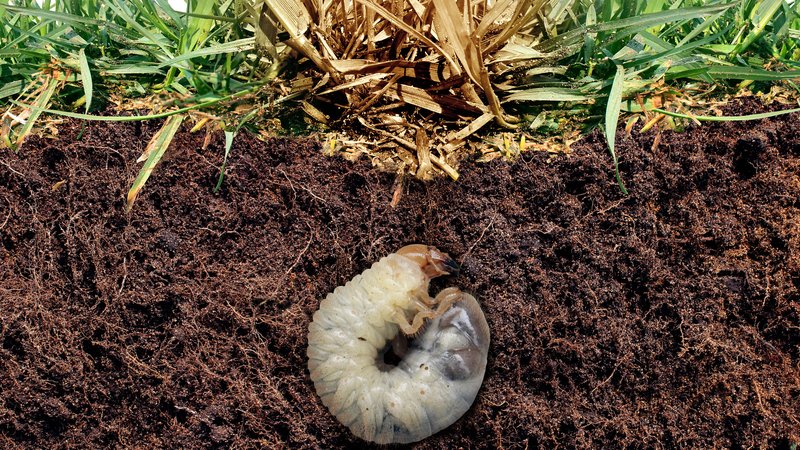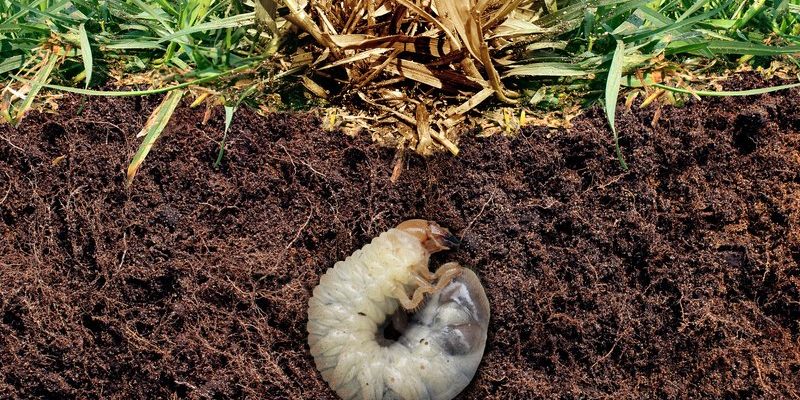
Imagine if your yard waste was like a pizza delivery—if you’re not careful with where you send it, you might just get an unexpected side of grub worms. Let’s face it: nobody wants that. Whether you’re a weekend warrior or just starting in lawn care, knowing how to manage your yard waste can help keep your garden healthy and free of these pesky pests.
Understanding Grub Worms
First off, let’s clarify what grub worms are. Essentially, they’re the larvae of certain beetles, particularly Japanese beetles and June bugs. These larvae look a bit like a curled-up, white caterpillar and live in the soil, feeding on the roots of grass and plants. It’s like having a secret party underground, but the party is not the kind you want happening in your garden. When you have a significant grub worm population, your lawn can start to look brown and patchy, kind of like a dog that’s over-groomed its fur.
Understanding when and where these grub worms thrive is crucial. They generally hatch in the summer months when the soil is warm and moist. If you’ve had a heavy rain followed by sunny days, it’s the perfect recipe for grub worm activity. And that’s where your yard waste comes into play. If you’re not careful about how you dispose of it, you might just be giving grub worms a free ride to a lush new home.
The Connection Between Yard Waste and Grub Worms
You might be wondering, “How exactly does yard waste contribute to grub worm spread?” Well, consider this: when you leave yard waste—like clippings, leaves, or dead plants—sitting in your yard, you’re providing an ideal habitat for these pests. It’s like rolling out the red carpet for them. Yard waste can trap moisture and create a perfect breeding ground. Think of all those organic materials as a buffet for the grubs. They love it!
Moreover, if you’re composting yard waste without proper management, you’re potentially bringing in beetles that lay the eggs that turn into grub worms. So, if you’re using homemade compost, make sure you’re doing it right. Only add materials that are free from pests, and turn your compost regularly to keep everything aerated and hot, which helps kill off any unwanted eggs or larvae.
Best Practices for Yard Waste Disposal
To prevent grub worms from hitching a ride with your yard waste, you’ll want to adopt some smart disposal practices. Here’s how you can go about it:
- Secure your yard waste: Use sealed bags or bins when collecting clippings and debris. This not only keeps it tidy but also prevents pests from accessing it.
- Don’t let it sit: Try to dispose of your yard waste promptly. The longer it stays in your yard, the more likely it is to attract pests.
- Use municipal services: Many towns offer yard waste pickup. It’s a great way to ensure that your waste isn’t sitting around attracting unwanted guests.
- Compost wisely: If you’re composting, ensure it’s well-maintained and hot enough to break down any potential pests or their eggs.
Adopting these habits can significantly reduce your chances of inviting grub worms into your lawn. Honestly, it’s all about creating an environment that’s less appealing to them.
Identifying Grub Worm Infestations
If you think you might already have a grub worm problem, it’s crucial to identify it as soon as possible. Look for these signs:
– **Brown patches:** Areas of your lawn that start to brown more than usual can be an indicator.
– **Soft turf:** If you notice that your grass feels spongy or soft when you step on it, it could mean the roots are being eaten away.
– **Increased animal activity:** If you see birds or other animals digging up your lawn, they might be after those tasty grubs.
Once you’ve identified the problem, it’s important to act quickly. Consider reaching out to a lawn care professional who can provide you with options for treatment. The faster you address the issue, the less damage your lawn will experience.
Utilizing Natural Predators
Believe it or not, there are helpful creatures out there that enjoy snacking on grub worms. Introducing or encouraging natural predators can be an effective way to manage your grub population without resorting to harsh chemicals.
Birds, for instance, love munching on grubs. Creating a bird-friendly environment in your yard can help keep those pesky pests in check. You might consider installing bird feeders, birdhouses, or even having a small water feature to attract them.
Additionally, certain beneficial nematodes in the soil can attack and kill grub larvae without harming your grass. These microscopic worms are natural enemies of grubs, so adding them to your soil can be a way to manage the population effectively. It’s like having a tiny army working for you underground!
When to Call for Professional Help
Sometimes, managing grub worms can be more than a DIY project, especially if your infestation has gotten out of hand. If you find that your lawn is consistently patchy and the natural methods aren’t doing the trick, it might be time to reach out to a lawn care professional.
Professional lawn care services can assess the situation thoroughly and recommend the best course of action. They can apply targeted treatments that are effective and safe for your yard. It’s like calling in the pros when you’re outmatched in a game; they have the skills and resources to tackle the problem head-on.
Also, if you’re considering using pesticides, it’s important to follow guidelines carefully. You want to ensure that any treatment you use is effective against grubs but gentle on the environment. Always check for eco-friendly products that won’t harm beneficial insects or other wildlife.
When it comes to avoiding the spread of grub worms through your yard waste, the key is to be proactive. Taking simple steps to manage your yard waste properly can make a world of difference. By understanding the biology of grubs and how they interact with your outdoor space, you equip yourself with the knowledge to keep your lawn healthy and thriving.
So, next time you do yard work, think of it as not just cleaning up but as a mission to protect your beautiful garden from those sneaky pests. After all, a little awareness goes a long way in maintaining a healthy, vibrant outdoor space free from grub worms.

